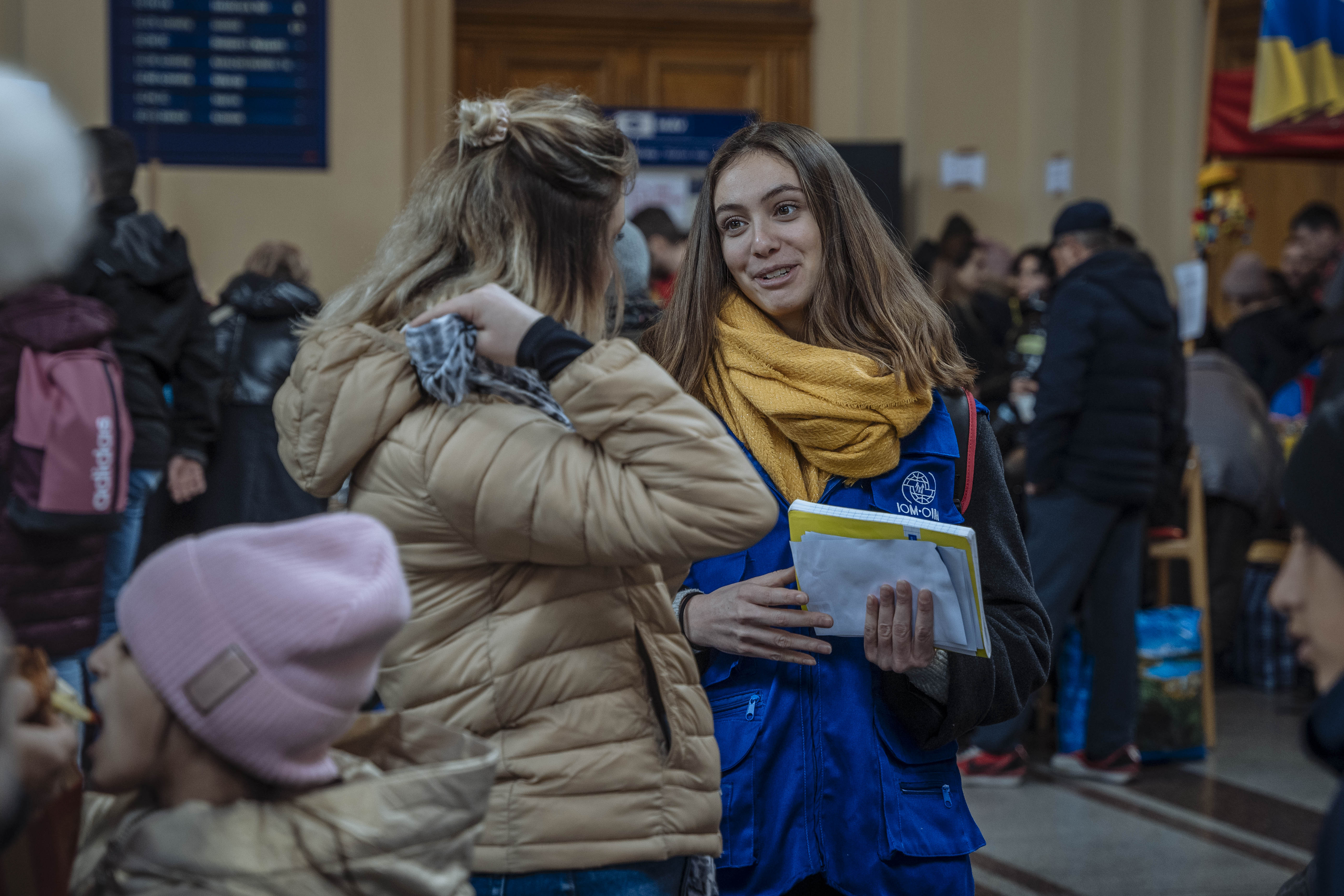Hungary, 24 August 2022 – Vasil had been looking forward to his pension after four decades of working with the same Ukrainian company. Instead, war broke out, forcing him to flee, putting his plans on hold and placing his only son in harm’s way.
The widower traveled on his own to neighbouring Hungary. His son is serving in the Ukraine military, a soldier in one of the regions experiencing the heaviest fighting. While aware there have been significant losses, Vasil remains optimistic he will soon see his son. “Both my past and my future remain in Ukraine,” he says.
“This tiny hope is keeping him alive,” says Szilárd Kovács, who works for the International Organization for Migration (IOM) mental health and psychosocial support (MHPSS) team in Hungary.
Vasil is among the more than 1 million people who have fled to Hungary in search of safety since Russia invaded its neighbour in February. Hungary is mainly a transit country for Ukrainians and third-country nationals (TCNs); many who arrive do not know what their next step will be. Uprooted from normal life, they face significant physical and mental challenges throughout their long and exhausting journey.
Most displaced people from Ukraine are single mothers traveling with children who face serious risks such as trafficking and exploitation. These difficulties are often compounded by the grief of having to leave loved ones behind; almost without exception, men between the ages of 18 and 60 are not permitted to leave Ukraine.

There are an estimated 6.4 million refugees from Ukraine across Europe, more than 90 per cent of whom are women and children. In Hungary, IOM staff are working to support the psychosocial well-being of displaced populations transiting through the country. Photo: IOM 2022/Muse Mohammed
In addition to providing temporary shelters to displaced Ukrainians, IOM staff in Hungary are helping them process the often severely disruptive events they have endured in recent months.
A member of IOM’s mobile health unit operating at the border, Szilárd provides psychological first aid to those in need at the temporary shelters provided by local authorities, where hundreds of newly arrived Ukrainians currently seek refuge.
“I learn a lot from them and I try my best to bring something to their lives,” he says.
Uncertainty abounds among many of those arriving at the shelter as they try to plan their next steps. Where to go, what to do, when to go home? These are questions which, for the moment, have no answers.
Others, however, express very precise plans for the near future. “Planning ahead can be considered a coping mechanism,” Szilárd explains.

Train stations across Hungary have become a hub for humanitarian agencies and private citizens who are providing a range of services to Ukrainian refugees and Third-Country Nationals (TCNs) arriving at the country’s borders. Photo: IOM 2022/Muse Mohammed
At Záhony railway station, an arrival point for displaced Ukrainians, needs can range from an immediate crisis intervention to just a supportive conversation. “Even just a few words can help,” says Szilárd.
When specialized assistance is needed, IOM staff refer individuals to different service providers. Many are referred to the Red Cross for medical services, while others receive legal assistance from the Helsinki Committee. Displaced people may also be referred to the Sovereign Order of Malta, a charitable enterprise, for further in-country transportation.
Szilárd recalls a particularly meaningful experience with a mother and her three children at the train station in Záhony. As they were drawing and folding paper planes decorated with Ukrainian flags, the group quickly grew as many other kids started to join.
“You could see the joy in their eyes,” he remembers. “This is the kind of activity that gives an opportunity for children whose lives have been so suddenly uprooted by conflict to be children again, even for just a few minutes. It’s priceless.”

Szilárd provides psychological support to a girl who fled Ukraine. Photo: IOM 2022
Olga, who has been working for IOM as a programme manager in complex emergencies and protracted armed conflicts for 15 years, emphasizes the need for a comprehensive mental health response that addresses the needs and concerns of those who have experienced devastating events, such as war.
Deployed to Ukraine’s neighbouring countries as a roving MHPSS Emergency Coordinator, Olga recently conducted an assessment at the border between Hungary and Ukraine, and in the short-term accommodations provided by IOM Hungary, to determine how best to support the psychosocial well-being of displaced populations transiting through the country.
“In these temporary shelters, life is on standby for the many women, men and children who have been forced to flee their homes, completely starting over in an unknown country – often with little to no resources,” Olga explains.
“This has greatly impacted their mental health as they grieve not only the loss of their former lives, but also their country itself.”
Displaced persons are often left with few alternatives regarding their life plans and future perspectives. IOM staff are bringing structure into their daily lives and a sense of belonging to help them cope with loss and grief by encouraging the creation of various committees, each with different responsibilities towards the community.
Caring for the well-being of others can also take a toll on the mental health of the professionals working tirelessly to help others. A recent assessment revealed that displaced populations and staff and volunteers need a safe space to process their emotions and experiences related to the war. Professionals and volunteers operating in these settings must be provided “care for the caregiver” initiatives. As a first step, a weekly discussion group has been established with the staff and volunteers in the shelters.
Since the outbreak of the war, 1.1 million people have arrived in Hungary from Ukraine; nearly 28,000 have applied for the temporary protection status in Hungary. IOM’s mobile health unit has provided mental health and psychosocial support to over 150 displaced Ukrainians, and 280 people have been identified as needing protection or other types of services.
As the conflict in Ukraine shows no sign of abating and needs of the displaced continue to rise, IOM teams are planning to expand these critical mental health services in areas where arrivals are highest.
By Anna Gergely, Media and Communications Assistant, IOM Hungary



